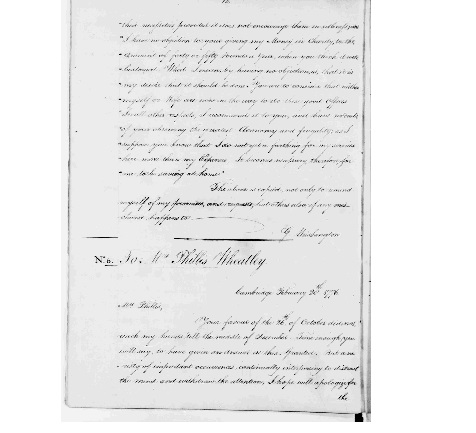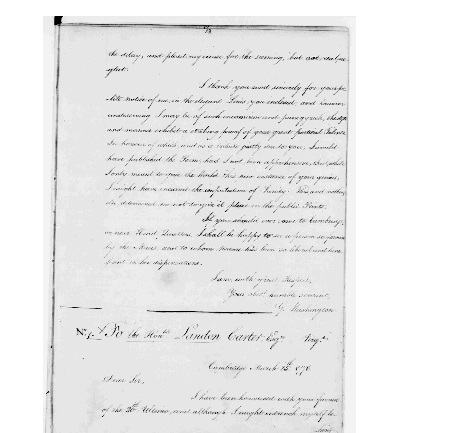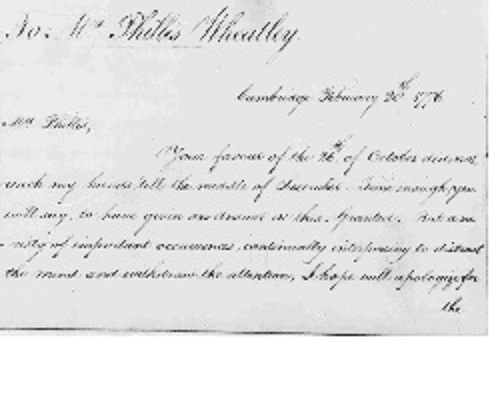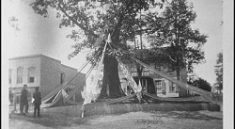Phillis Wheatley, Poem for George Washington, Washington response and letter, Rest of story
From MountVernon.org.
“Although George Washington may have personally met her only once for a period of around half an hour, the kindness and respect that he showed toward Phillis Wheatley, a female African slave, serves as a telling example of his moral complexity and capacity for humanitarian understanding.
The name of the young girl who became known as Phillis Wheatley was formed from a combination of the name of the slave ship that brought her to Boston from West Africa at the age of seven, the Phillis, and the surname of the family who purchased her. Compared to most slave owners, John and Susanna Wheatley were strikingly compassionate. They allowed their eighteen-year-old daughter Mary to begin tutoring the young Phillis in Greek, Latin, poetry, and other subjects.
Eventually Wheatley’s owners began to see such great potential in her intellectual development that they excused her from household duties and allowed her to focus on her studies. The level of education that Wheatley reached, although she was never formally schooled, was unique not only for a slave but also for many women at the time. She began to write poetry as early as twelve years of age and gained international recognition in 1771 with the publication of an elegy commemorating the death of a preacher named George Whitefield.
In December of 1775, Washington – the newly appointed Commander-in-Chief of the Continental Army – received a letter from Wheatley containing an ode written in his honor. The poem illustrates Wheatley’s somewhat surprisingly passionate patriotic sentiment, which factors strongly in much of her poetry. It ends with a stanza reading: “Proceed, great chief, with virtue on thy side, / Thy ev’ry action let the goddess guide. / A crown, a mansion, and a throne that shine, / With gold unfading, WASHINGTON! Be thine.”
Washington responded with a letter expressing his appreciation for Wheatley’s poem. He even considered publishing it but feared people might interpret that action as self-aggrandizing. Not only was this letter the only one Washington is known to have written to a former slave, but he addressed Wheatley as “Miss Phillis” and signed off as “Your obed[ien]t humble servant,”1 unusual and even paradoxical courtesies. Washington also extended an invitation for Wheatley to call on him at his headquarters in Cambridge, Massachusetts.”
Read more:
https://www.mountvernon.org/library/digitalhistory/digital-encyclopedia/article/phillis-wheatley/
Phillis Wheatley poem October 26, 1775.
“CElestial choir! enthron’d in realms of light,
Columbia’s scenes of glorious toils I write.
While freedom’s cause her anxious breast alarms,
She flashes dreadful in refulgent arms.
See mother earth her offspring’s fate bemoan,
And nations gaze at scenes before unknown!
See the bright beams of heaven’s revolving light
Involved in sorrows and the veil of night!
The goddess comes, she moves divinely fair,
Olive and laurel binds her golden hair:
Wherever shines this native of the skies,
Unnumber’d charms and recent graces rise.
Muse! bow propitious while my pen relates
How pour her armies through a thousand gates:
As when Eolus heaven’s fair face deforms,
Enwrapp’d in tempest and a night of storms;
Astonish’d ocean feels the wild uproar,
The refluent surges beat the sounding shore;
Or thick as leaves in Autumn’s golden reign,
Such, and so many, moves the warrior’s train.
In bright array they seek the work of war,
Where high unfurl’d the ensign waves in air.
Shall I to Washington their praise recite?
Enough thou know’st them in the fields of fight.
Thee, first in place and honours,—we demand
The grace and glory of thy martial band.
Fam’d for thy valour, for thy virtues more,
Hear every tongue thy guardian aid implore!
One century scarce perform’d its destined round,
When Gallic powers Columbia’s fury found;
And so may you, whoever dares disgrace
The land of freedom’s heaven-defended race!
Fix’d are the eyes of nations on the scales,
For in their hopes Columbia’s arm prevails.
Anon Britannia droops the pensive head,
While round increase the rising hills of dead.
Ah! cruel blindness to Columbia’s state!
Lament thy thirst of boundless power too late.
Proceed, great chief, with virtue on thy side,
Thy ev’ry action let the goddess guide.
A crown, a mansion, and a throne that shine,
With gold unfading, Washington! be thine.”
George Washington response letter.
“TO MISS PHILLIS WHEATLEY.
.
Your favor of the 26th of October did not reach my hands, till the middle of December. Time enough, you will say, to have given an answer ere this. Granted. But a variety of important occurrences, continually interposing to distract the mind and withdraw the attention, I hope will apologize for the delay, and plead my excuse for the seeming but not real neglect.
I thank you most sincerely for your polite notice of me, in the elegant lines you enclosed; and however undeserving I may be of such encomium and panegyric, the style and manner exhibit a striking proof of your poetical talents; in honor of which, and as a tribute justly due to you, I would have published the poem, had I not been apprehensive, that, while I only meant to give the world this new instance of your genius, I might have incurred the imputation of vanity. This, and nothing else, determined me not to give it place in the public prints.
If you should ever come to Cambridge, or near head-quarters, I shall be happy to see a person so favored by the Muses, and to whom nature has been so liberal and beneficent in her dispensations. I am, with great respect, your obedient humble servant.”





